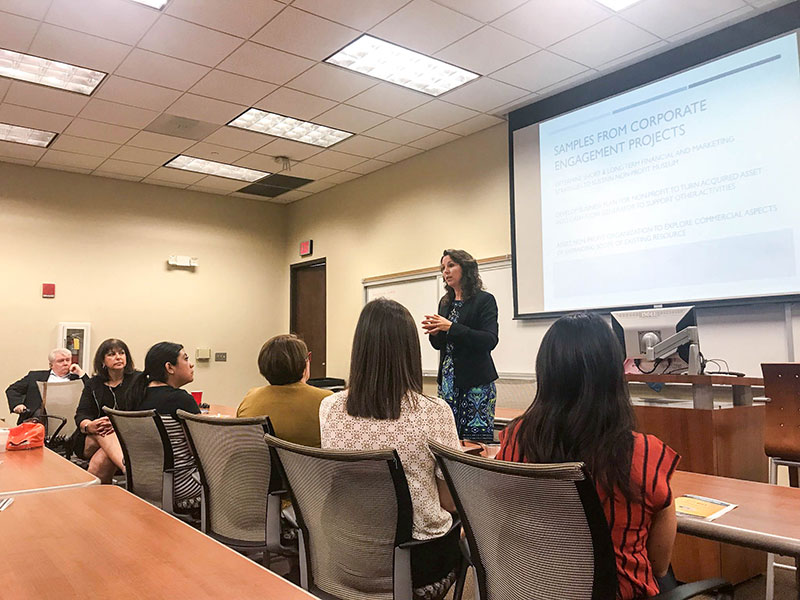Executive MBA Students Partner with Local Nonprofits
Last Updated on August 02, 2018 at 5:30 PM
Originally published August 02, 2018
By Victor Arreola
UTEP Communications
A recently launched program from The University of Texas at El Paso’s College of Business Administration (COBA) will harness the knowledge and experience of its Executive MBA students to assist nonprofits that serve the Paso del Norte region.

Robert Nachtmann, DBA, dean of the college, announced on July 24, 2018, the creation of the EMBA Community Engagement Project (CEP) in partnership with the United Way of El Paso County. The EMBA students, typically advancing managers who already have at least five years in leadership roles, will apply their proven talents and community understanding to help local nonprofits address their challenges.
“We are truly excited to launch the Community Engagement Project as a partnership with the United Way of El Paso County," Nachtmann said. "Our college’s commissioning directive to each graduating MBA class is to ‘Do well for your organization, its employees, its shareholders, and its clients and customers; but in doing well, ensure that you do good for the community!’ The Community Engagement Project engages our Executive MBA students in the task of advancing the performance of our not-for-profit sector. In so doing, all of our region benefits.”
Starting in January 2019, teams made up of three or four EMBA students will work with nonprofit community partners to help those organizations to meet their needs and improve on delivery of their core services. CEP organizers said students will help nonprofits tackle and resolve a spectrum of challenges such as identifying inefficiencies, implementing more effective resource allocation, improving financing mechanisms and resolving breakdowns in governance.
The United Way of El Paso County is bringing together a wide range of community groups to inform them about the opportunity, and to encourage them to get involved in the initiative.
“As a legacy nonprofit in El Paso, our United Way has had the good fortune of acting as the convener of many meaningful collaborations, and we’re delighted to include the UTEP Executive MBA Community Engagement Project,” said Deborah Zuloaga, president and CEO of the United Way of El Paso County. “This project is expected to make a significant and direct impact on the success of our fellow nonprofits by providing them the ability to move beyond short-term goals and instead focus on attainable, long-term goals."
Organizers designed CEP to create benefits that flow in both directions. This means the students who participate in the program also stand to reap a series of benefits. These include learning through applied experience, enhanced team and project management capabilities, and plenty of networking opportunities. Beyond this, college administrators such as Nachtmann hope that as EMBA students advance in their roles as leaders and decision makers, their exposure to the inner workings of local nonprofit organizations will foster long-term relationships with those organizations, leading to more engagement and support.
The Paso del Norte Children’s Development Center is ready to explore the opportunities presented by the CEP initiative. The center provides therapeutic, educational and support services to children with special needs and their families. Executive Director Al Velarde says the organization enjoys broad support and he wants it to grow. He said one of the first projects he would like help with is to plan the best way to expand its operations using the limited funds the center received during a recent capital campaign. The hope is that the students, with their fresh perspectives and varied backgrounds and experiences, could make a tangible and lasting impact on the future of the center.
“I am very excited about the potential opportunities presented to local nonprofits to partner with COBA and the United Way to help bring forth necessary strategic resources to help strengthen nonprofit organizations such as the Paso del Norte Children’s Development Center,” Velarde said. “The Community Engagement Project will provide Executive MBA students an opportunity to learn the challenges of operating (a nonprofit organization) and their needs while, at the same time, an NPO will get affordable professional support to develop the planning necessary to make good business decisions.”
If community-supported organizations, with help from EMBA students, can demonstrate that they are becoming more efficient, more people will feel compelled to support them, Nachtmann said.
This will allow those organizations to offer their services to more people. It is an elegantly simple idea, but those putting it into practice agree that the CEP has the potential to unleash positive and profound change in the local nonprofit sector.